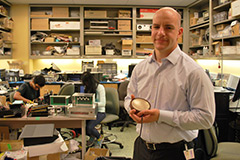Communicating your research to someone without a science background
By Eleni Kanavas
Dr. Daniel Pajek knows all too well that talking about your research to a nonscientific audience is no easy feat. “As PhD students, we spend a lot of time discussing the minutia of details that make up our projects, [and] the details may not be very interesting to people outside of the institute. It’s difficult to summarize the impact of what you are doing in a few short sentences and figure out a succinct story to tell,” says Pajek, who did his doctorate in the focused ultrasound lab of Dr. Kullervo Hynynen, director of Physical Sciences at Sunnybrook Research Institute (SRI), and defended his PhD thesis in July.
Pajek studied systems design engineering at the University of Waterloo and began his career working in a consulting role at Deloitte. His interest in the commercialization of medical technologies led him to pursue graduate studies in medical biophysics at the University of Toronto.
He is now the president of FUS Instruments, a start-up company spun out of SRI research to commercialize preclinical focused ultrasound devices. Here, he tells Eleni Kanavas how his experience has helped him explain his research to a variety of audiences.
What is the focus of your research?
The goal of my thesis was to explore the application of focused ultrasound to treat acute ischemic stroke, where a blood clot causes a stroke in the brain. Essentially, we investigated using high-power ultrasound to break up clots in the brain.
Why is it important to be able to communicate your research in plain language?
For me, part of it is that medical technology is a field that requires cooperation among individuals with different expertise. At Sunnybrook, where we’re working with clinicians, biologists, physicists, electrical engineers and machinists, it’s important to be able to communicate what you are doing with all those individuals. I definitely think that Sunnybrook is a great environment to learn how to communicate complex ideas in a straightforward way, and I think learning those skills becomes important, [especially] as you want to work in those multidisciplinary teams.
How has your education helped you in your career?
Working in the lab has given me exposure to many aspects of medical device development, from simulations to preclinical research to working with clinical systems. The focus of FUS Instruments is to develop focused ultrasound research systems that can be used by labs at other institutes. My time in the lab has helped me understand the needs of researchers.
How would you describe your first time explaining your research project?
When I was becoming introduced to the subject, I would talk in-depth about some of the things I had learned and was excited about. All those details would quickly become uninteresting to the audience, so it took a number of tries before I landed on a succinct story that resonated well with people.
I also found nonscientific groups were often more interested in hearing about clinical applications that had occurred, as opposed to the science behind it. After the essential tremor trial happened, I would often discuss the trial and how impactful it was that someone could come in with an uncontrollably shaky hand and leave without a shaky hand, all in a same-day procedure.
How do you respond to someone’s questions?
Very carefully, when talking to someone without a background in the same subject area. It can be difficult sometimes because someone will ask a question, and then you quickly need to think of the answer and think of a way to translate it to everyone. It’s almost like speaking a different language; you have to think twice before the information comes out.
What advice do you have for trainees about explaining their research?
It’s important to think about the impact of what you’re doing, as this will resonate with people the most. I think it’s also important to self-filter, to eliminate jargon from what you’re saying. If you’re ever entering a situation where you’re expected to give a presentation or talk to a lot of people, it’s useful to rehearse what you’re going to say, because you’re probably used to speaking about what you’re doing with people in your own subspecialty.
One thing I’ve noticed throughout my degree is that I’ve benefitted a lot from getting to work with people from other disciplines. I think that in doing this, you learn to distill concepts and communicate with people using plain language. You learn to respect the perspectives of people with different skills and get a sense as to how your work fits into a bigger picture.



